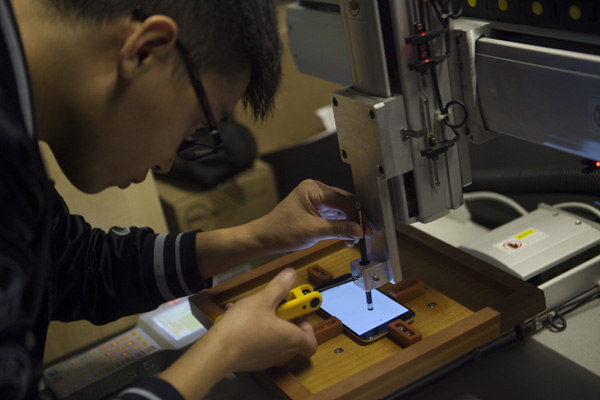|
 |
|
A young "maker" tests the sensitivity of a smartphone screen with a self-developed robot arm in Shenzhen. The city has become an innovation hub and enticed a special breed of talent with big ideas to match. [Photo/China Daily] |
A growing group of young, talented graduates are heading to the Huaqiangbei area of Shenzhen in search of the next great business idea
Decked out in a simple washed-out T-shirt, skillfully operating a computer and various gadgets, Zhang Hao is easily mistaken for a student working in a busy laboratory.
But the 28-year-old college graduate, who was once an editor for a popular science association, has an unusual ambition-h(huán)e wants to build a robot by 2027 that will clean your home.
"I would like every Chinese family to own one," Zhang, who comes from eastern China's Zhejiang province, said. "The cost of buying this robotic house cleaner would roughly be the same as a standard sedan. It would be nice to find a commercial partner, but if I can't, I will build it myself. That is the basic target."
Zhang spends 16 hours a day, seven days a week, in a small room located in the hot and humid city of Shenzhen, the Chinese mainland's earliest special economic zone, neighboring Hong Kong. And he loves every minute.
"It's fun," he said. "I'm stretching myself. If I walked out of the door tomorrow and was knocked down by a car, I would die happy because I'm doing something I love."
Zhang is not unique about his passion. In fact, he is one of a growing group of "makers" in China, especially in Shenzhen.
Most "makers" are young and well-educated, understand Computerized Numerical Control, 3D printing and laser cutting, and are willing to share their ideas.
They also have incredible dreams and are keen to turn them into reality.
In recent years, the term "maker" has become a byword in China for people who are do-it-yourself hardware designers, inventors, budding entrepreneurs or people who simply make things.
Many just build things for fun, while others have big business plans.
Gao Lei, 32, who comes from Central China's Henan province, had a simple idea. Last year, he made a wrist band which could track the wearer's fitness while exercising and send back data.
The gadget was developed for parents with children and couples. The parents can have on-time information of their children, and the couple can interactive conveniently. For his efforts, he received 3 million yuan ($480,000) of angel funding and is now focusing on developing more funky fitness applications.
From copycat heaven, Shenzhen is now trying to become China's Silicon Valley by attracting young "makers" with cool facilities and workshops.
The term "maker" was coined to explain the tide of technical innovation in Germany and the US since the 1960s.
